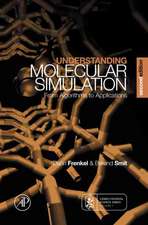Extracellular Matrix in Development: Biology of Extracellular Matrix
Editat de Douglas W. DeSimone, Robert Mechamen Limba Engleză Paperback – 9 apr 2015
| Toate formatele și edițiile | Preț | Express |
|---|---|---|
| Paperback (1) | 937.56 lei 6-8 săpt. | |
| Springer Berlin, Heidelberg – 9 apr 2015 | 937.56 lei 6-8 săpt. | |
| Hardback (1) | 947.67 lei 6-8 săpt. | |
| Springer Berlin, Heidelberg – 29 mar 2013 | 947.67 lei 6-8 săpt. |
Din seria Biology of Extracellular Matrix
- 27%
 Preț: 1502.96 lei
Preț: 1502.96 lei - 18%
 Preț: 940.57 lei
Preț: 940.57 lei - 18%
 Preț: 943.43 lei
Preț: 943.43 lei - 18%
 Preț: 1822.89 lei
Preț: 1822.89 lei - 24%
 Preț: 792.83 lei
Preț: 792.83 lei - 5%
 Preț: 713.33 lei
Preț: 713.33 lei - 5%
 Preț: 718.50 lei
Preț: 718.50 lei - 5%
 Preț: 1297.54 lei
Preț: 1297.54 lei - 18%
 Preț: 1110.41 lei
Preț: 1110.41 lei - 18%
 Preț: 1123.04 lei
Preț: 1123.04 lei - 18%
 Preț: 947.35 lei
Preț: 947.35 lei - 24%
 Preț: 955.35 lei
Preț: 955.35 lei - 20%
 Preț: 1040.97 lei
Preț: 1040.97 lei - 18%
 Preț: 892.59 lei
Preț: 892.59 lei - 18%
 Preț: 1109.16 lei
Preț: 1109.16 lei
Preț: 937.56 lei
Preț vechi: 1143.36 lei
-18% Nou
Puncte Express: 1406
Preț estimativ în valută:
179.42€ • 186.18$ • 149.97£
179.42€ • 186.18$ • 149.97£
Carte tipărită la comandă
Livrare economică 17-31 martie
Preluare comenzi: 021 569.72.76
Specificații
ISBN-13: 9783642427404
ISBN-10: 3642427405
Pagini: 264
Ilustrații: X, 253 p.
Dimensiuni: 155 x 235 x 14 mm
Greutate: 0.37 kg
Ediția:2013
Editura: Springer Berlin, Heidelberg
Colecția Springer
Seria Biology of Extracellular Matrix
Locul publicării:Berlin, Heidelberg, Germany
ISBN-10: 3642427405
Pagini: 264
Ilustrații: X, 253 p.
Dimensiuni: 155 x 235 x 14 mm
Greutate: 0.37 kg
Ediția:2013
Editura: Springer Berlin, Heidelberg
Colecția Springer
Seria Biology of Extracellular Matrix
Locul publicării:Berlin, Heidelberg, Germany
Public țintă
ResearchCuprins
Part I Informational signals in extracellular matrix and matrix influences on cell movement in the developing embryo.- Part II Extracellular matrix-direct morphogenesis, growth factor signaling, and maintenance of the stem cell niche.- Part III Model organisms and the lexicon of developmental signals associated with the extracellular matrix.
Textul de pe ultima copertă
Cells in the developing embryo depend on signals from the extracellular environment to help guide their differentiation. An important mediator in this process is the extracellular matrix – secreted macromolecules that interact to form large protein networks outside the cell. During development, the extracellular matrix serves to separate adjacent cell groups, participates in establishing morphogenic gradients, and, through its ability to interact directly will cell-surface receptors, provides developmental clocks and positional information. This volume discusses how the extracellular matrix influences fundamental developmental processes and how model systems can be used to elucidate ECM function. The topics addressed range from how ECM influences early development as well as repair processes in the adult that recapitulate developmental pathways.
The series Biology of Extracellular Matrix is published in collaboration with the American Society for Matrix Biology.
The series Biology of Extracellular Matrix is published in collaboration with the American Society for Matrix Biology.
Caracteristici
Gives a comprehensive and up to date overview on the field Written by experts in the field Covers the role of ECM in development from all angles Includes supplementary material: sn.pub/extras















